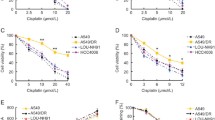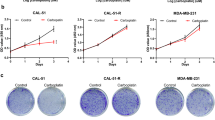Abstract
Cisplatin (DDP) is the most widely used chemotherapy agent for treatment of malignancies including lung cancer. However, the effectiveness of DDP is often weakened by acquired resistance of tumor cells. DDP kills cancer cells primarily by creating intrastrand and interstrand DNA cross-links, which block DNA replication. The Fanconi anemia (FA)/BRCA pathway is a DNA cross-link damage repair pathway, which regulates cellular resistance to DNA cross-link agents, such as DDP. Some study has shown that natural compound curcumin sensitize human ovarian and breast cancer cells to DDP. However, whether curcumin may reverse resistance to DDP in DDP-resistant lung cancer cells has not been understood. In this study, we showed that curcumin enhanced the proliferation inhibitory effect of DDP and promote DDP-induced apoptosis in A549/DDP cells (DDP-resistant lung adenocarcinoma cells). Moreover, we observed that FA/BRCA pathway DNA damage repair processes, such as DDP-induced FANCD2 monoubiquitination and nuclear foci formation were downregulated in the presence of curcumin, suggesting that curcumin enhanced sensitivity to DDP in A549/DDP cells through the inhibition of FA/BRCA pathway. Furthermore, the calculation of q value and apoptosis analyses revealed that curcumin in combination with DDP could exert a synergistic cytotoxic effect in A549/DDP cells, further demonstrating that curcumin can reverse cisplatin resistance of A549/DDP cells. In conclusion, by suppressing the FA/BRCA pathway DNA repair, curcumin potentiates DDP-induced proliferation inhibitory effect and apoptosis in A549/DDP cell, indicating that curcumin may serve as a chemosensitizer to cross-link-inducing anticancer drugs DDP.



Similar content being viewed by others
References
Spira SG, Silvestri GA. The treatment of advanced non-small cell lung cancer. Curr Opin Pulm Med. 2005;11:287–91.
Massarelli E, Herbst RS. Use of novel second-line target therapies in non-small cell lung cancer. Semin Oncol. 2006;33 suppl 1:s9–16.
Spira A, Ettinger DS. Multidisciplinary management of lung cancer. N Engl J Med. 2004;350:379–92.
Resell R, Cecere F, Santarpia M, Noemi R, Miquel T. Predicting the outcome of chemotherapy for lung cancer. Curr Opin Pharmacol. 2006;6:323–31.
Kartalou M, Essigmann JM. Mechanisms of resistance to cisplatin. Mutat Res. 2001;478:23–43.
Kelland L. The resurgence of platinum-based cancer chemotherapy. Nat Rev Cancer. 2007;7:573–84.
Kennedy RD, D’Andrea AD. DNA repair pathway in clinical practice: lesions from pediatric cancer susceptibility syndromes. J Clin Oncol. 2006;24:3799–808.
Kim H, D’Andrea AD. Regulation of DNA Cross-link repair by the Fanconi anemia/BRCA pathway. Genes Dev. 2012;26:1393–408.
Auerbach AD. Fanconi anemia and its diagnosis. Mutat Res. 2009;668:4–10.
Alan D. The Fanconi anemia and breast susceptibility pathway. N Engl J Med. 2010;362:1909–19.
Kee Y, D’Andrea AD. Expanded roles of the Fanconi anemia pathway in preserving genomic stability. Genes Dev. 2010;24:1680–94.
Su X, Huang J. The Fanconi anemia pathway and DNA interstrand cross-link repair. Protein Cell. 2011;2:704–11.
Taniguchi T, Tischkowitz M, Ameziane N, Hodgson SV, Mathew CG, Joenje H, et al. Disruption of the Fanconi anemia-BRCA pathway in cisplatin-sensitive ovarian tumors. Nat Med. 2003;9:568–74.
Sakai W, Swisher EM, Karlan BY, Agarwal MK, Higgins J, Friedman C, et al. Secondary mutations as a mechanism of cisplatin resistance in BRCA-mutated cancers. Nature. 2008;451:1116–20.
Jagtap S, Meganathan K, Wagh V, Winkler J, Hescheler J, Sachinidis A. Chemoprotective mechanism of the natural compounds, epigallocatechin-3-O-gallate, quercetin and curcumin against cancer and cardiovascular diseases. Curr Med Chem. 2009;16:1451–62.
Shishodia S, Chalurvedi MM, Aggarwal BB. Role of curcumin in cancer therapy. Curr Probl Cancer. 2007;31:243–305.
Ye MX, Li Y, Yin H, Zhang J. Curcumin: updated molecular mechanisms and intervention targets in human lung cancer. Int J Mol Sci. 2012;13:3959–78.
Duarte VM, Han E, Veena MS, Salvado A, Suh JD, Liang LJ, et al. Curcumin enhances the effect of cisplatin in suppression of head and neck squamous cell carcinoma via inhibition of IKKβ protein of the NFκB pathway. Mol Cancer Ther. 2010;9:2665–75.
Xu XB, Chen B, Liu WY. Curcumin inhibits the invasion of thyroid cancer cells via down-regulation of PI3K/kt signaling pathway. Gene. 2014;546:226–32.
Zang S, Liu T, Shi J, Qiao L. Curcumin: a promising agent targeting cancer stem cells. Anticancer Agents Med Chem. 2014;14:787–92.
Chirnomas D, Taniguchi T, de la Vaga M, Vaidya AP, Vasserman M, Hartman A-R, et al. Chemosensitization to cisplatin by inhibitors of the Fanconi anemia/BRCA pathway. Mol Cancer Ther. 2006;5:952–61.
Xiao H, Xiao Q, Zhang K, Zuo X, Shresthan UK. Reversal of multidrug resistance by curcumin through FA/BRCA pathway in multiple myeloma cell line MOLP-2/R. Ann Hematol. 2010;89:399–404.
Shao Z-M, Shen Z-Z, Liu C-H, Sartippour MR, Heber D, Nguyen M. Curcumin exerts multiples suppressive effects on human breast carcinoma cells. Int J Cancer. 2002;98:234–40.
Chen Q, Van der Sluis PC, Boulware D, Hazlehurst LA, Dalton WS. The FA/BRCA pathway is involved in melphalan-induced DNA interstrand cross-link repair and accounts for melphalan resistance in multiple myeloma cells. Blood. 2005;106:698–705.
van der Heijden MS, Brody JR, Gallemier E, Cunningham SC, Dezentje DA, Shen D, et al. Function defects in the Fanconi anemia pathway in pancreatic cancer cells. Am J Pathol. 2004;165:651–7.
Burkitt K, Ljungman M. Compromised Fanconi anemia response due to BRCA1 deficiency in cisplatin-sensitive head and neck cancer cell lines. Cancer Lett. 2007;8:131–7.
Zhang J, Wang X, Lin C-J, Conch FJ, Fei P. Altered expression of FANCL confers mitomycin C sensitivity in calu-6 lung cancer cells. Cancer Biol Ther. 2006;5:1632–6.
Burkitt K, Ljurgman M. Phenylbutyrate interferes with the Fanconi anemia and BRCA pathway and sensitized head and neck cancer cells to cisplatin. Mol Cancer. 2008;7:24.
Yarde DN, Oliveira V, Mathews L, Wang X, Villagra A, Boulware D, et al. Targeting the Fanconi anemial BRCA pathway circumvents drug resistance in multiple myeloma. Cancer Res. 2009;69:9367–75.
Chen J, Dexheimer TS, Ai Y, Liang G, Villamil MA, Inglese J, et al. Selective and cell-active inhibitors of the USP1/UAF1 deubiquitinase complex reverse cisplatin resistance in non-small cell lung cancer cells. Chem Biol. 2011;18:1390–400.
Kee Y, Huang M, Chang S, Moreau LA, Park E, Smith PG, et al. Inhibition of the Nedd8 system sensitive cells to DNA interstrand cross-linking agents. Mol Cancer Res. 2012;10:369–77.
Litan R, Gupta R, Brosh Jr RM, Cantor SB. BRCA-FA pathway as a target for anti-tumor drugs. Anticancer Agents Med Chem. 2008;8:423–30.
Hucl T, Gallmeier E. DNA repair: exploiting the Fanconi anemia pathway as a potential therapeutic target. Physiol Res. 2011;60:453–65.
Shukl P, Solank A, Ghos K, Vundinit BR. DNA interstrand cross-link repair: understanding role of Fanconi anemia pathway and therapeutic implications. Eur J Haematol. 2013;9:381–93.
Kunnunakkara AB, Anand P, Aggarwal BB. Curcumin inhibits proliferation, invasion, angiogenesis and metastasis of different cancers through interaction with multiple cell signaling protein. Cancer Lett. 2008;269:199–255.
Yu LL, Wu JG, Dai HG, Si JM. Curcumin reverses chemoresistance of human gastric cancer cells by downregulating the NF-Kappa B transcritption factor. Oncol Rep. 2011;26:1197–203.
Jana NR, Diskshit P, Goswami A, Nukina N. Inhibition of proteasomal function by curcumin induces apoptosis through mitochondrial pathway. J Biol Chem. 2004;219:11680–5.
Jacquemont C, Taniguchi T. Proteasome function is required for DNA damage response and Fanconi anemia pathway activation. Cancer Res. 2007;67:7395–405.
Conflicts of interest
None
Author information
Authors and Affiliations
Corresponding author
Rights and permissions
About this article
Cite this article
Chen, P., Li, J., Jiang, HG. et al. Curcumin reverses cisplatin resistance in cisplatin-resistant lung caner cells by inhibiting FA/BRCA pathway. Tumor Biol. 36, 3591–3599 (2015). https://doi.org/10.1007/s13277-014-2996-4
Received:
Accepted:
Published:
Issue Date:
DOI: https://doi.org/10.1007/s13277-014-2996-4




